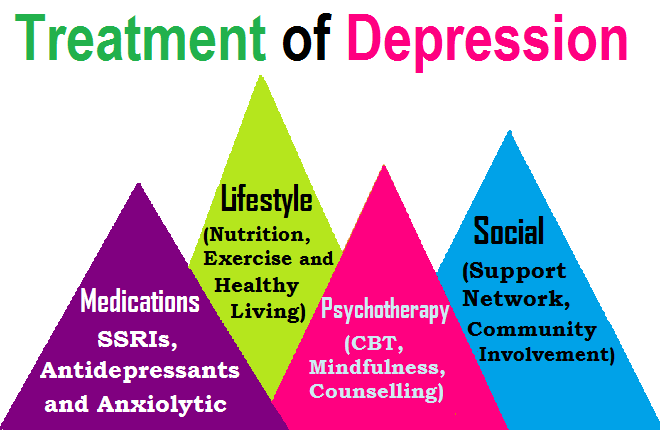Depression
is a common and serious medical illness that lasts more than days and
negatively affects how people feel, the way they think and how they act.
Depression
is a mood or emotional state that affects the soul and the body and causes
feelings of sadness and/or a loss of interest in activities one usually enjoys
and this can lead to many emotional and physical problems.
 |
| Everything you need to know about depression |
Depression: Symptoms,
Risk Factors, Types, and Complications - How to Deal with Depression and
Sadness
What is Depression?
Depression
is one of the most prevalent diseases in the world. It is different from
the erratic or bad moods and compulsive thoughts experienced
by someone.
Depression can
even become a serious condition that prevents the individual from practicing
his normal life.
A person
with depressive disorder has difficulty performing his duties and integration
in the family and at work, as depression causes them to feel a lack of
desire to live.
Depression
is a continuous state of sadness, apathy and other symptoms that persist for a
period of at least two weeks.
Depression
does not indicate weakness or an individual's negative personality, but it is a
treatable health problem.
Who is at Risk of Depression?
Many experts
tend to believe that genes and genetic factors play a larger role in
depression, as a parent or sibling is more likely to develop depression.
Studies show
that women are at least twice as likely to develop depression as men.
What Are the Risk Factors for Depression?
The exact
cause of depression is not yet known. The belief, as with other
psychiatric illnesses, is that many biochemicals, biological and genetic
factors can be the cause of depression, including:
Biochemical factors: Research using imaging techniques has confirmed that physical changes in the brains of people with depression have occurred.
It is not
yet clear what these changes are and how important they are, but the
clarification of this will eventually help define and identify the causes of
depression.
It is
possible that naturally occurring chemicals in the human brain, called
neurotransmitter and related to mood, play a role in causing depression.
An imbalance
in the body's hormonal system can also cause depression.
Genetic factors: Some studies suggest that the onset of depression is more common in people with relatives of biologists with depression.
Researchers
are still trying to detect genes related to depression.
Environmental factors: The environment is considered as the cause of depression, to a certain degree.
Environmental
factors are conditions and circumstances in life which are difficult to
cope with and coexist with, such as the loss of a loved one, economic problems,
and severe tension.
There is no accurate statistical data, but depression is a very widespread disease.
Depression
transcends all boundaries and differences, ethnic, and socio-economic. No one
is immune to depression.
Depression
generally begins in the late 20s, but depression may occur at any age and may
affect anyone, from young children to adults.
The number
of women diagnosed with depression is twice that of men. This may partly be due
to the fact that women are more likely to seek treatment for depression.
What Are the Main Causes of Depression?
The exact
cause of the onset of depression is not known, but research suggests many
factors that appear to increase or aggravate the risk of depression, including:
—The
presence of first-degree relatives suffering from depression, addiction or
suicide.
—Certain
traits in the personality, such as the individual being pessimistic, suffer
from low self-esteem and constant self-criticism.
—Other
psychological conditions, such as anxiety, or post-traumatic stress disorder.
—Addiction
to alcohol or drugs.
—Exposure to
shocks, stress or traumatic events, such as loss of a close associate or
difficult relationship.
—Exposure to
psychological trauma or depression in childhood or adolescence.
—Exposure to
chronic or serious diseases such as heart disease, cancer, Alzheimer's or
AIDS.
—Mood
depressed in the morning
—Use of
certain drugs may cause side effects such as depression, which should not be
stopped only by consulting the specialist.
Types of depression
There
are several types of depression related to certain conditions such as
environmental conditions or age and they may include:
Seasonal
depression: The
so-called "seasonal affective disorder", which is a type of seasonal
depression that occurs in the form of sadness usually begins in late autumn and
early winter, and ends in the spring and summer.
This grief
affects all people by 3% to 20% depending on the nature of the place where the
person lives.
Postpartum
depression: A
type of depression that affects about 12% of mothers, where their mood worsens
and shows symptoms of severe depression but additional teams, this depression
may endanger the child's existence,
It is
difficult for the mother to communicate with her child and to establish links
with him or take care with it.
Manic
depression: Unipolar
disorder is a recurrence of uninhibited depression. Bipolar disorder is the
feeling of depression, mania, and mixed moods.
Retarded
depression: A
depression that afflicts the elderly characterized by a delusional illness,
constant irritability, and has its own causes and individual development.
Symptoms of Depression
The
individual is diagnosed as suffering from depression if he suffers from five of
the following symptoms:
*The feeling of deep sadness most of
the time and almost every day, and show the person the features of crying, or
as if he wants to cry.
A depressed
person does not feel the taste of life, not happiness or joy or anything
beautiful.
*An imbalance in weight, a person
loses weight and loses his appetite or earns a lot of weight relatively short.
*The indifference of the person to
what is happening around him, the results of his actions or his
responsibilities, and the slowness of movements and speech and reactions on a
daily basis almost.
*The person does not feel any pleasure
in life, or the desire to practice the hobbies that he loved. On the contrary,
he wants isolation and unity.
*The loss of focus in everyday
business is simple, the person becomes oblivious, unable to think, or makes
sound decisions almost daily.
*Feelings of self-confidence and guilt
almost daily.
*Lack of sleep, insomnia, inability to
get enough sleep without frequent waking, or sleeping for too long, for longer
periods, and not being able to wake up for long periods of the day and trying
to evade reality and negative emotions.
*Too much thought of death, and in
advanced cases may dominate the suicidal feeling and thoughts.
*Physical fatigue and loss of energy,
and inability to do any simple work, such as changing clothes, things appear
harder than they actually are and take a person longer to accomplish.
Complications of Depression
There are a
number of complications that are associated with depression and exposed to the
patient, if not received the necessary treatment, including:
- Addiction to alcohol abuse.
- Self-harm.
- Physical pain and illness.
- Obesity problems that may lead to diabetes.
- Family conflicts and problems in social relations.
- Social isolation and social phobia.
What are General Methods Used to Treat Depression?
By
proper diagnosis and treatment, the symptoms of depression can be reduced, even
if the symptoms of depression are severe.
Proper
treatment can improve the feeling of people with depression within a few weeks,
usually, and can return to normal life as they used to enjoy before the onset
of depression.
There are several ways to treat depression, such as the use of antidepressant and antidepressant therapy.
But the
treatment by these drugs is effective only for half of the patients, apart from
the side effects of these drugs, in addition to it may cause addiction, and
does not help to solve the underlying problem that caused depression.
To improve
the feeling only, which made many of the patients stop using it, but it is
effective if accompanied by medication therapy by talking to a specialist and
undergo cognitive behavioral therapy, and the use of a healthy lifestyle and
exercise to improve mood and psychological condition.
How to Deal with Depression and Sadness
Today, most
health workers deal with depression as a chronic disease that requires
long-term treatment, just as diabetes is treated with hypertension.
Some people
with depression experience only one period of depression, but in most patients
the symptoms of depression recur and last a lifetime.
If you feel depressed for several weeks or more, schedule a doctor's appointment. He will discuss with you the symptoms and will tell you about treatments that can help you to feel better. It can also be useful to experiment with some handling techniques.
Be more active
Do not
withdraw from life. Sharing people can improve your mood. Staying in touch with
friends and family means that you have someone to talk to when you feel
depressed.
Exercise regularly
There is
evidence that exercise can help adjust your mood. If you have not practiced for
some time, start gently by walking for 20 minutes every day. Learn more about
exercising to treat depression.
Face your fears
Do not avoid
the things you find difficult. When people feel depressed or anxious, they
sometimes avoid talking to others. Some people can lose their confidence to do
things like driving or traveling.
If this starts
to happen, confronting these situations will help them become easier.
Do not drink alcohol
Alcohol can
become a problem for some people. Alcohol can not help you solve your problems.
It can make you feel more depressed.
Have a routine
When people
feel depressed, they can practice bad sleep patterns, watch until late and
sleep during the day.
Try to get
out of bed at your usual time and stick to your protein as much as possible.
Lack of food
can affect your nutrition.
You can stop
cooking regular meals and instead eat snacks throughout the day or miss
breakfast because you are still in bed.
Search for help to treat depression
Talk to your
doctor, if you continue to feel depressed or anxious after several weeks.
If you start
feeling that you cannot deal and that life has become too difficult or that
your life is not worth living, get help right away.
These are
the signs that require you to talk to someone.
There are
many treatments available to treat depression, including speech therapy,
antidepressant medication, and self-reliance.
If you have
experienced depression or anxiety in the past, even if you have not been
systematically diagnosed, seek help immediately.
You will be
more likely to have an episode of depression if you have a predisposition.
Tags
clinical depression
clinical psychology
depression symptoms
manic depressive psychosis
mental health
psychological disorders
psychology
suicidal thoughts

